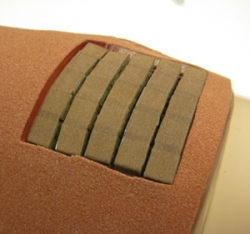UW Prosthetic Sensing Array Gives “Feeling” to Artificial Limbs
The Fringing Field Sensor Array (FFSA) is a collection of high-resolution pressure sensors that can accurately measure sheer stress, pressure, and other characteristics at the limb-prosthetic interface.

Seattle, WA, November 28, 2011 --(PR.com)-- The Sensors, Energy, and Automation Laboratory of the University of Washington, in collaboration with the U.S. Department of Veterans Affairs, has completed development of a prototype Fringing Field Sensor Array (FFSA). “An improved version of the previously developed Fringing Field Plantar Array,” Dr. Kishore Sundara-Rajan states, “The Fringing Field Sensor Array is a flexible collection of high-resolution pressure sensors that can be incorporated into the lining of artificial limbs, accurately and noninvasively measuring sheer stress, pressure, and other characteristics at the limb-prosthetic interface.”
The sensitivity and sheer range of data that the FFSA can provide will revolutionize the creation and fitting of artificial limbs, as it will allow doctors and researchers to design artificial limbs specifically tailored for individual patients’ residual limb surfaces. In addition, the FFSA can be used in diagnostic devices to measure contact patterns and reveal strain and stress information, enabling the design of prosthetics that are more comfortable and natural than ever before possible. Because the FFSA can measure both pressure and sheer stress, it is the ideal tool to lead the future development of more natural prosthesis research. Since its initial announcement, several companies have expressed interest adopting the FFSA for both prosthesis fitting and diagnostic measurements. Mystery Ranch (Bozeman, Montana), a USA-based manufacturer of military-grade backpacks and rucksacks, plans to use this technology for further optimization of their top-of-the line products to improve both comfort and longevity.
###
The sensitivity and sheer range of data that the FFSA can provide will revolutionize the creation and fitting of artificial limbs, as it will allow doctors and researchers to design artificial limbs specifically tailored for individual patients’ residual limb surfaces. In addition, the FFSA can be used in diagnostic devices to measure contact patterns and reveal strain and stress information, enabling the design of prosthetics that are more comfortable and natural than ever before possible. Because the FFSA can measure both pressure and sheer stress, it is the ideal tool to lead the future development of more natural prosthesis research. Since its initial announcement, several companies have expressed interest adopting the FFSA for both prosthesis fitting and diagnostic measurements. Mystery Ranch (Bozeman, Montana), a USA-based manufacturer of military-grade backpacks and rucksacks, plans to use this technology for further optimization of their top-of-the line products to improve both comfort and longevity.
###
Contact
SEAL
Alexander Mamishev
(206) 221-5729
www.ee.washington.edu/research/seal/
Alexander Mamishev
(206) 221-5729
www.ee.washington.edu/research/seal/
Multimedia

Downloadable PDF
This PDF version of the release includes an additional diagram depicting the function of the FFSA when used as a liner for a prosthetic leg.
Categories
